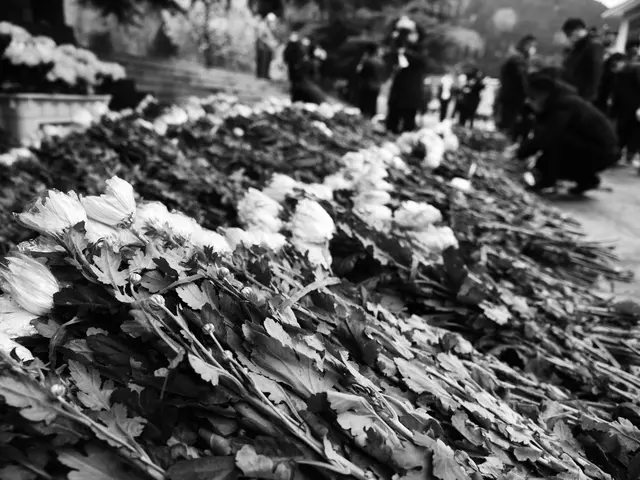With bunches of chrysanthemums and a camera, Guo Yong and Liu Yajie, organ donation coordinators from the Second Xiangya Hospital of Central South University, came to Fenghuangshan Cemetery in Changsha, capital of central China's Hunan province.
The cemetery is home to 580 organ donors whose tombstones are built as a huge and tall memorial wall.
For the sake of epidemic control, collective memorial activities were canceled on this year's Tomb-sweeping Day. The organ procurement organization of the hospital opened a website to mourn the organ donors online.
Liu designed a program that offers online bouquet presenting and silent tribute. To make sure the donors' families have a dedicated space, Liu and Guo took photos of every tombstone and uploaded them to the online program.
"Behind each name are the joys and sorrows of several families. Life will be gone, but it could also continue," Liu said.
UNFORGETTABLE MEMORIES OF DONORS
When taking photos of the 2-year-old Tong Tong (pseudonym), Liu's hands were trembling. The little girl's life ended in August 2018, when Liu received a message that Tong Tong's parents hoped to donate her double kidneys and cornea.
"At the moment I rushed to ICU, the girl's parents had been choking with sobs," Liu said.
Since becoming an organ donation coordinator in 2014, Liu received and witnessed numerous rejections and hesitations, but few have been as supportive as Tong Tong's parents. "The mother is the same age as me, and I can feel how hard she must be."
After the donation, Tong Tong's parents sat in front of the morgue all night.
The next day, Liu drove the parents home. "After getting off, they bowed to me and thanked me for helping them continue their daughter's life." On that day, Tong Tong's donation gave three patients a new life.
Though standing on a high ladder to take photos, Liu reached out and touched the black-and-white photograph of the 2-year-old girl.
Guo Yong, Liu's colleague, stared at a tombstone engraved with "Lei" (pseudonym). He will never forget the mother's heartwrenching cry on Christmas Eve in 2012.
On December 24, 2012, Guo, who was a surgeon at that time, found after an operation that a hospital in the city of Yiyang, 300 km away from Changsha, had called him many times, telling him that Lei, a 20-year-old university student was brain dead due to a traffic accident.
Guo and several doctors drove to the hospital in Yiyang and met Lei's bitterly crying mother and his silent father, as well as a dozen of his relatives.
When Guo did not know how to start the conversation, the father said, "my son can contribute to society. It is good, and I agree."
Guo witnessed the operation of the organ donation, wiped Lei's body, dressed him, sent him to the funeral home, and brought his ashes to Fenghuangshan Cemetery.
As Lei's parents refused the compensation, Guo converted it to Lei's sister's tuition, which is paid to the parents by the local Red Cross society every September.
In 2019, Lei's sister was admitted to a university. Guo coordinated a sum of money with the Second Xiangya Hospital to support his sister to finish her university studies.
"Your sister also entered university now. We will take good care of her for you, and we all miss you very much," after the tombstone photo was uploaded, Guo wrote on Lei's online memorial space.
"Life is not eternal, but love and sincerity can be immortal," Guo said.
A MORE OPEN, CIVILIZED SOCIETY
As one of the earliest doctors engaged in organ transplantation in Hunan, Guo witnessed the whole process from a difficult start to a mature operation.
"I have been in contact with organ transplantation since 2011 when the awareness of the society in this field was low," said Guo, who went to many hospitals across the province to introduce organ transplantation. That year, his hospital performed seven organ transplants.
As of March 31, Hunan province had donated 2,492 organs after the death of its citizens, donating 6,718 large organs, bringing 6,271 seriously ill patients back to life.
"As people's minds become more and more open, I am very gratified that we are not strongly resisted by family members, but accepted by more people, and even received applications frequently," Guo Yong said.
According to a report on organ transplantation in China (2015-2018) released in December 2019, from 2015 to 2018, there were 2,766, 4,080, 5,146 and 6,302 organ donations annually in China, representing a rapid growth. In 2018, China ranked second in the world in the number of organ donations and transplants.
The National Health Commission has extensively promoted public awareness and encouraged the public to take an active part. Currently, China has registered over 1.89 million organ donation volunteers.
Guo and Liu remember the name and story of each donor they contacted. For them, this is the respect for the deceased and consolation for the living.
"Every time I come to this cemetery and see those familiar names, it is like seeing my family and friends," Guo Yong said. "I thank them from the bottom of my heart for existing in this world in another way."
(by Xinhua writers Liu Fangzhou, Yuan Ruting)
 简体中文
简体中文





